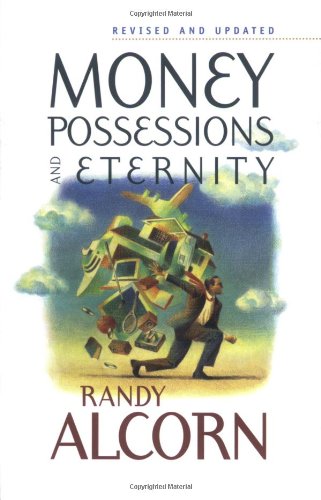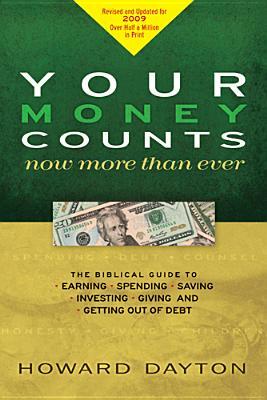While giving and saving are virtuous ways to steward finances, it is also necessary and good to spend some of our money, as long as we do it wisely and intentionally. First, reflect on the Scripture verses below.
“But if anyone does not provide for his relatives, and especially for members of his household, he has denied the faith and is worse than an unbeliever.” (1 Timothy 5:8)
“Do not love the world or the things in the world. If anyone loves the world, the love of the Father is not in him. For all that is in the world—the desires of the flesh and the desires of the eyes and pride of life—is not from the Father but is from the world. And the world is passing away along with its desires, but whoever does the will of God abides forever.” (1 John 2:15-17)
The rich rules over the poor, and the borrower is the slave of the lender. (Proverbs 22:7)
“For what does it profit a man to gain the whole world and forfeit his soul?” (Mark 8:36)
—-
Next, take the time to watch these brief videos from Compass on spending and debt.
“Use Cash”
“What Does the Bible Say?”
“Impatience”
“Student Loans”
“Buying a Used Car”
“Eating Out”
“Living Simply”
—-
One of the most confusing and stressful purchases for people can be the purchase of a house. Even though you may be many years away from this decision, read Compass’s guide for potential homebuyers and commit to following a similar plan when the time comes (Source).
“Buy An Affordable House”
Our experience with tens of thousands of homebuyers has led us to define an affordable home using two rules of thumb:
- Save up at least 20 percent of the purchase price for the down payment. This way you will avoid paying for expensive PMI insurance which does not benefit you at all.
- Your total housing expenses should be 30-40 percent of your gross income, and should never exceed 40 percent.
That 30-40 percent includes all housing expenses: mortgage payment, real estate taxes, utilities, insurance, and maintenance (estimate maintenance each year to be 1-2 percent of the value of the home). If these combined expenses exceed 40 percent of your income, you will need to reduce spending in other categories.
Finding an affordable home is particularly challenging in areas where the cost of housing is extremely expensive. If you are in this situation, there are only three things you can do: save, pray and wait. Save for the down payment; ask the Lord to provide you with an opportunity to buy an affordable home; wait and continue to rent until He does.
Many honest lenders will tell you exactly what you can and cannot afford to borrow. Others care more about their compensation. Since many work on a commission their motivation is to close the deal. They might qualify you for a loan that is too expensive. So, be careful not exceed the guideline of 30-40 percent of income for all housing expenses.
—–
Compass also offers a helpful guide for spending as a married couple. This may not seem applicable to you at the moment, but cultivating a right attitude toward money now will save you from strife in not only marriage, but in other relationships as well (Source).
“Married Couple Spending”
What a couple spends on lifestyle can have a massive impact on their finances and relationship. Differing expectations, if they are not reconciled, can damage or even destroy a marriage. It is crucial for couples to agree on the lifestyle they sense God wants for them—one that is affordable and enables them to achieve their long-term goals together.
One of the biggest obstacles to reaching unity in lifestyle is the persuasive power of advertising—at the cost of hundreds of billions of dollars every year—all targeted at getting us to spend more. Whether the product is cars, clothing, or even deodorants, the message is clear: the happy, sexy, wrinkle-free life can be ours if we are willing to buy it.
And if we can’t afford it now? No problem; we can always charge it. Advertisers are pros at creating discontentment and turning wants into “needs.”
Five of the six times the word contentment appears in the Bible, it involves money. The apostle Paul said, “I have learned to be content whatever the circumstances. I know what it is to be in need, and I know what it is to have plenty. I have learned the secret of being content in any and every situation, whether well fed or hungry, whether living in plenty or in want. I can do everything through [Christ] who gives me strength” (Philippians 4:11-13, emphasis mine).
Oh, and by the way. Paul wrote those words from prison. In chains.
The fact is, no one is born with the instinct of contentment. Along with Paul, it’s something we must learn. It resists the urge to buy, buy, buy and enables us to live within our means.
Early in our marriage, we realized that if we were going to reach our long-term goals, we needed to control spending. We needed to be content with a sane lifestyle in spite of our “shop ’til you drop” culture. We decided that short-term sacrifices were unimportant compared to the long-term benefits of making progress toward true financial freedom.
So we asked ourselves these questions about each spending category: (1) Can we make lifestyle decisions that will reduce our spending? (2) Do we need this item? (3) If we need it, can we get it less expensively?
I want to challenge you as a couple to ask the same questions about your spending and prospective purchases. The objective is to reduce spending so you can create more surplus each month—giving you the ability to give more, pay off debt more quickly, and save more. To aid your thinking, let me share some of our decisions.
First, instead of moving to a larger home, we decided our modest starter home would be our finisher one. We lived in the home for twenty-nine years until we moved out of state. We paid off the mortgage as quickly as possible, which eliminated our biggest monthly expense—the house payment. Dream with me: how would you feel if you owned your home free and clear? We came to the same conclusion—it makes an immense difference!
Then, we chose to buy only reliable used cars for cash and drive them until wheels fell off! Bev drove the same car for seventeen years. We used to call it “Puff” because of the smoking exhaust pipe whenever she accelerated.
I once bought a truck that cost only a hundred dollars—and it looked it! A sympathetic neighbor borrowed it and brought it back, painted. Suddenly it looked like a two hundred dollar truck! While driving the truck one morning, I was enjoying a time of special worship and remembered Psalm 16:11: “In the presence of the Lord is fullness of joy.”
It didn’t matter whether I was driving a hundred-dollar clunker or the most expensive car on the market; I could experience fullness of joy because of my relationship with Jesus Christ. Advertisers have led us to believe that our deepest needs can be satisfied only by purchasing the newest and the best. Nothing could be further from the truth.
It’s hard to overestimate the financial impact of driving debt-free cars. The average monthly new car payment is $375. If a 21-year-old married couple drives debt-free cars and save the $375 per month, earning an average return, they will accumulate about $4 million by age 65! Short-term spending sacrifices translate into enormous long-term benefits.
Comparison
Comparing your lifestyle with others often leads to horrible financial decisions. Many couples have suffered by trying to “keep up with the Joneses” whether they could afford it or not. Young couples are especially susceptible, wanting to begin with the same lifestyle their parents took years to build. They often buy homes, cars, and clothing that are just too expensive.
Some want to create an affluent facade to impress others. Don’t fall into this trap! Author George Fooshee observed, “People buy things they do not need with money they do not have to impress people they do not even like.”
Jesus taught, “For not even when one has an abundance does his life consist of his possessions” (Luke 12:15, NASB). Think of your possessions simply as tools to help you accomplish what God wants you to do for Him. He has entrusted you with assets that He intends you to use for His purposes—and that doesn’t include trying to fake it ’til you make it.
Spend to bless your mate
Early in our marriage I focused our spending on what I wanted, without giving much consideration to Bev’s desires. I didn’t understand that Philippians 2:3-4 applied to my marriage: “Do nothing out of selfish ambition or vain conceit, but in humility consider others better than yourselves. Each of you should look not only to your own interests, but also to the interests of others.”
As I have grown in my relationship with Christ, however, my mentality has completely changed. The question I now ask is: What can I do with our finances to be a blessing to my wife? Fortunately, Bev asks the same question: How can our spending be a blessing to my husband?
God has called all of us to bless each other, and this certainly applies to the relationship between husbands and wives. “To sum up, all of you be harmonious, sympathetic, brotherly, kind-hearted, and humble in spirit; not returning evil for evil or insult for insult, but giving a blessing instead; for you were called for the very purpose that you might inherit a blessing” (1 Peter 3:8-9, NASB).
As you develop the mentality of wanting to bless your mate, you are likely to make a discovery: you actually enjoy buying something for him or her more than for yourself. It’s a practical application of what Jesus told us in Acts 20:35: “It is more blessed to give than to receive.”











